Related Research Articles
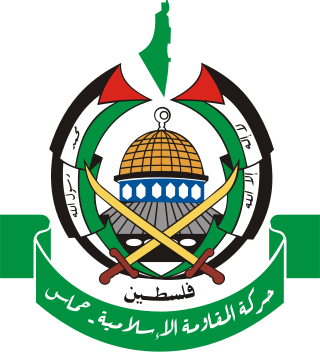
Hamas, an acronym of its official name, Harakat al-Muqawama al-Islamiya, is a Palestinian Sunni Islamist political and military movement governing parts of the Israeli-occupied Gaza Strip since 2007.

The Second Intifada, also known as the Al-Aqsa Intifada, was a major uprising by Palestinians against the Israeli occupation, characterized by a period of heightened violence in the Palestinian territories and Israel between 2000 and 2005. The general triggers for the unrest are speculated to have been centered on the failure of the 2000 Camp David Summit, which was expected to reach a final agreement on the Israeli–Palestinian peace process in July 2000. An uptick in violent incidents started in September 2000, after Israeli politician Ariel Sharon made a provocative visit to the Al-Aqsa compound, which is situated atop the Temple Mount in East Jerusalem; the visit itself was peaceful, but, as anticipated, sparked protests and riots that Israeli police put down with rubber bullets, live ammunition, and tear gas. Within the first few days of the uprising, the IDF had fired one million rounds of ammunition.
Sheikh Ahmed Ismail Hassan Yassin was a Palestinian politician and imam who founded Hamas, a Palestinian militant Islamist and nationalist organization in the Gaza Strip, in 1987.
Abdel Aziz al-Rantisi was a Palestinian political leader and co-founder of Hamas, along with Sheikh Ahmed Yassin.
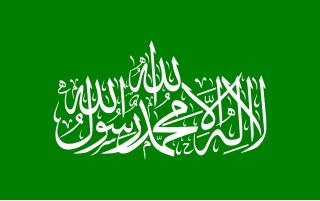
The Ezzedeen Al-Qassam Brigades, named after Izz ad-Din al-Qassam, is the military wing of the Palestinian nationalist organization Hamas. Currently led by Mohammed Deif, EQB is the largest and best-equipped militant group operating within Gaza today.

Fathi Ibrahim Abdulaziz Shaqaqi was a Palestinian physician, militant leader and the founder and Secretary-General of the Palestinian Islamic Jihad (PIJ).

Palestinian political violence refers to actions carried out by Palestinians with the intent to achieve political objectives that can involve the use of force, some of which are considered acts of terror, and often carried out in the context of the Israeli–Palestinian conflict. Common objectives of political violence by Palestinian groups include self-determination in and sovereignty over Palestine, or the "liberation of Palestine" and recognition of a Palestinian state, either in place of both Israel and the Palestinian territories, or solely in the Palestinian territories. This includes the objective of ending the Israeli occupation. Some of the factions have called for the destruction of the state of Israel. More limited goals include the release of Palestinian prisoners held by Israel and recognition of the Palestinian right of return.

Interpal is the working name for Palestinian Relief and Development Fund, a British charity founded in 1994 that describes itself as a non-political charity to alleviate problems faced by Palestinians, and focused solely on the provision of relief and development aid to the poor and needy Palestinians the world over, but primarily in the Palestinian territories, Lebanon and Jordan.
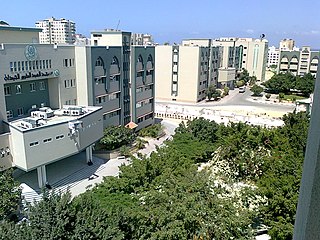
The Islamic University of Gaza, also known as IUG and IU Gaza, is an Independent Palestinian University established in 1978 in Gaza City. It was the first higher education institution to be established in the Gaza Strip. The university has 11 faculties capable of awarding BA, BSc, MA, MSc, MD, PhD, diplomas and higher diplomas, in addition to 20 research centers and institutes and the affiliated Turkish-Palestinian Friendship Hospital.
The History of Hamas is an account of the Palestinian Islamist fundamentalist socio-political organization with an associated paramilitary force, the Ezzedeen al-Qassam Brigades. Hamas (حماس) Ḥamās is an acronym of حركة المقاومة الاسلامية Ḥarakat al-Muqāwamat al-Islāmiyyah, meaning "Islamic Resistance Movement".
Ahmed al-Jabari, also known as Abu Mohammad, was a senior leader and second-in-command of the military wing of Hamas, the Izz ad-Din al-Qassam Brigades. He was widely credited as the leading figure in the Hamas takeover of the Gaza Strip, and commanded the 2006 Hamas cross-border raid which resulted in the capture of Israeli soldier Gilad Shalit. Under his command, along with chief logistics officer Mahmoud al-Mabhouh, Hamas developed its own military weapons capability significantly by acquiring longer-range guided missiles and rockets.
Reem Saleh Riyashi was a Palestinian suicide bomber from Gaza City who killed herself and four Israelis at the Erez crossing on 14 January 2004. Hamas and the Al-Aqsa Martyrs Brigade claimed that the attack by Riyashi was a joint operation mounted as a response to weeks of Israeli incursions into West Bank cities that had left about 25 Palestinians dead.
Ahmed Yousef was a senior adviser to Gaza's Prime Minister Ismail Haniya and remains close to current Hamas leadership. Beginning in 1968, Ahmed Yousef was the pupil of the founder of Hamas, Sheikh Ahmed Yassin. Yousef previously served as the Executive Director of the United Association for Studies and Research, a U.S.-based non-profit organization that has been called a front operation for Hamas. He also served as editor of UASR’s quarterly journal The Middle East Affairs Journal. Yousef returned to Gaza in 2005 following the withdrawal of the Israeli army and the victory of Hamas in the legislative elections. In 2006 he was appointed as the political advisor to then-Prime Minister Ismail Haniya. He is now the head of the House of Wisdom Institution for Conflict Resolution and Governance in Gaza.
The Gaza–Israel conflict is a localized part of the Israeli–Palestinian conflict beginning in 1948, when 200,000 Palestinians fled or were expelled from their homes, settling in the Gaza Strip as refugees. Since then, Israel has fought 15 wars against the Gaza Strip. The number of Gazans reportedly killed in the most recent 2023–2024 war — 37,000 — is higher than the death toll of all other wars of the Arab–Israeli conflict.
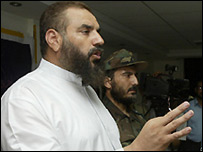
Nizar Rayan was a high-ranking Hamas leader who served as a liaison between the Palestinian organization's political leadership and its military wing. Also a professor of Islamic law, he became a top Islamic cleric within Hamas after the death of Sheikh Ahmed Yassin in 2004. Rayan was a strong promoter between 1994 and 2004 of suicide bombings on Israel, and his son killed himself on one such mission. Rayan and most of his family were killed in an Israeli airstrike during the Gaza War.

Shuja'iyya, also Shejaiya, Shijaiyeh, Shujayya, Shuja'ia, Shuja'iya, is a neighborhood district of the Palestinian city of Gaza and one of the largest neighborhoods in Gaza, once holding 92,000 to 100,000 residents. It is located east of Gaza's city center, and its nucleus is situated on a hill located across the main Salah al-Din Road that runs north-south throughout the Gaza Strip. Shuja'iyya contains several ancient structures, mosques and tombs. The Commonwealth War Cemetery is located 2 kilometres (1.2 mi) north of the commercial center of the neighborhood.
Sheikh Radwan is a district of Gaza City located nearly 3 kilometers (1.9 mi) northwest of the city center. It borders al-Shati camp to the southwest, Rimal to the south, and Jabalia to the east. The Sheikh Radwan Cemetery is located in the district. It contains hundreds of graves for Palestinians killed in the Israeli–Palestinian conflict, including Hamas leaders Ahmed Yassin, Abdel Aziz al-Rantissi, and Said Siam.
The Union of Good, also known as the Charity Coalition, is an umbrella organization consisting of over 50 Islamic charities and funds which funnel money to organizations belonging to Hamas, which currently rules the territory of the Gaza Strip. Hamas, which characterizes itself as an "Islamic resistance movement against Israeli occupation" is also on the US State Department list of Foreign Terrorist Organizations.

The Sheikh Omar Hadid Brigade, also known as Islamic State in Gaza, is an Islamist militant group affiliated with the Islamic State in Iraq and the Levant that was reportedly active in the Gaza Strip around 2015. Its goals have consistently matched those of the Islamic State, in that it seeks to establish the al-Sham caliphate. As such, it opposes all forms of Palestinian nationalism while also supporting the elimination of all Jews and other ethno-religious 'infidels' from the region.
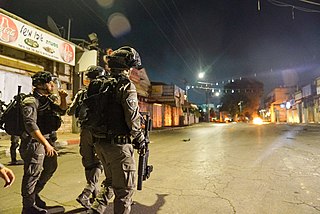
The 2021 Israel–Palestine crisis, sometimes called the Unity Intifada, was a major outbreak of violence in the Israeli–Palestinian conflict that mainly commenced on 10 May 2021, and continued until a ceasefire came into effect on 21 May. It was marked by protests and police riot control, rocket attacks on Israel by Hamas and Palestinian Islamic Jihad (PIJ), and Israeli airstrikes in the Gaza Strip. The crisis was triggered on 6 May, when Palestinians in East Jerusalem began protesting over an anticipated decision of the Supreme Court of Israel on the eviction of six Palestinian families in the East Jerusalem neighborhood of Sheikh Jarrah. Under international law, the area, effectively annexed by Israel in 1980, is a part of the Israeli-occupied West Bank; On 7 May, according to Israel's Channel 12, Palestinians threw stones at Israeli police forces, who then stormed the Al-Aqsa Mosque compound using tear gas, rubber bullets, and stun grenades. The crisis prompted protests around the world as well as official reactions from world leaders.
References
- 1 2 Higgins, Andrew (2009-01-24). "How Israel Helped to Spawn Hamas". The Wall Street Journal. Archived from the original on September 26, 2009. Retrieved 2010-08-24.
- ↑ Hamas Victory Is Built on Social Work. Los Angeles Times, March 2, 2006.
- ↑ "Women and the Hijab in the Intifada", Rema Hammami Middle East Report, May–August 1990
- ↑ "HAMAS and Israel: Conflicting Strategies of Group-Based Politics" (PDF). Retrieved 11 June 2010.
- ↑ "Sheikh Yassin: Spiritual figurehead". BBC Online . 22 March 2004. Retrieved 7 August 2007.
- ↑ Hamas: Politics, Charity, and Terrorism in the Service of Jihad (2006) by Matthew Levitt. pp 23-25 ISBN 978-0300122589
- 1 2 "IRAN'S GAZA GOONS CAUGHT AT HELM OF BOMB FACTORY," by ANDY SOLTIS with Post Wire Services, New York Post, Feb. 3, 2007 Archived 2008-12-04 at the Wayback Machine
- ↑ "Gaza is hit with more Israeli airstrikes," by Steven Erlanger, New York Times, Friday, May 18, 2007
- ↑ Jerusalem Post, Dec 29, 2008, IAF bombs Islamic University's R&D labs, By YAAKOV KATZ [ permanent dead link ]
- ↑ "Israel strikes university in Gaza City". Al Jazeera. Retrieved 3 June 2015.
- ↑ Islamic Charitable Society, Orphans Under Threat.
- 1 2 "Panorama: Faith, Hate and Charity", Panorama , BBC One, 30 July 2006
Faith, hate and charity: Transcript